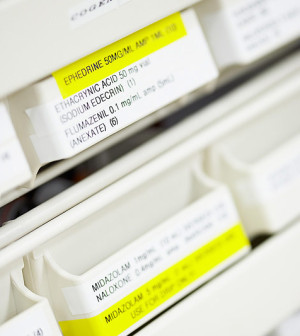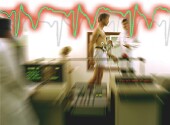- The Best Time of Day to Drink Bone Broth to Maximize Health Benefits
- 8 Ways to Increase Dopamine Naturally
- 7 Best Breads for Maintaining Stable Blood Sugar
- Gelatin vs. Collagen: Which is Best for Skin, Nails, and Joints?
- The Long-Term Effects of Daily Turmeric Supplements on Liver Health
- Could Your Grocery Store Meat Be Causing Recurring UTIs?
- Are You Making This Expensive Thermostat Error This Winter?
- Recognizing the Signs of Hypothyroidism
- 10 Strategies to Overcome Insomnia
- Could Artificial Sweeteners Be Aging the Brain Faster?
More Americans Working to Control Blood Pressure, Cholesterol: CDC


Although more Americans are trying to lower their blood pressure and cholesterol levels, more needs to be done to reduce the number of heart attacks and strokes in the United States, government health officials said Thursday.
Each year, about 1.5 million people in the United States have a heart attack or stroke, killing many and leaving others with lingering disability, according to the U.S. Centers for Disease Control and Prevention.
In 2011, the U.S. Department of Health and Human Services launched the Million Hearts initiative, a program that aims to prevent 1 million heart attacks and strokes by 2016. A report looking at the early effects of the effort was published May 30 in the CDC’s Morbidity and Mortality Weekly Report.
The news was not as good as officials had hoped.
“Although trends in the Million Hearts measures are encouraging, additional efforts by the general public and health care providers are needed to reduce heart attack and stroke risk factors to prevent 1 million heart attacks and strokes by 2016,” said report author Matthew Ritchey, from CDC’s division for heart disease and stroke prevention.
Ritchey said smoking and salt consumption needs to be tackled more aggressively with community awareness efforts, and doctors need to counsel more patients to stop smoking and control their blood pressure and cholesterol levels. For those who have already had a heart attack or stroke, physicians need to stress the importance of taking an aspirin every day.
Dr. Gregg Fonarow, a professor of cardiology in the preventative cardiology program at the University of California, Los Angeles, had this to say about the results: “Vast opportunities remain to improve the use of aspirin, statins and blood pressure control strategies, along with recommended lifestyle modifications, for the adult population.”
Fonarow noted that there have been no improvements in the use of daily aspirin for those who need it, and that improvements in blood pressure control, cholesterol treatment and smoking cessation were small.
“Despite compelling evidence, guidelines and a vast array of educational and public health initiatives, there are still large numbers of individuals engaging in unhealthy behaviors and not receiving one or more therapies that effectively prevent heart attacks and strokes,” Fonarow said.
The Million Hearts program assesses four risk factors for heart attack and stroke, called the ABCS — aspirin, blood pressure, cholesterol and smoking.
The program is designed to get people who need it to take aspirin daily, control their blood pressure and cholesterol levels, and quit smoking. To reach the goal of stopping 1 million heart attacks and strokes by 2016, 65 percent of patients need to stop smoking and take high blood pressure and high cholesterol medications, while decreasing their salt intake by 20 percent (to about 2,900 milligrams a day).
However, the first round of statistics on the program show that the goal has not been met yet.
According to the report, there was no significant change in the use of aspirin to prevent a second heart attack or stroke since 2009/2010 — it stayed steady at just under 54 percent of heart attack patients.
There was some improvement in terms of blood pressure control, with medications prescribed for about 43 percent of patients in 2009/2010 and nearly 52 percent of patients in 2011/2012. Similar increases were seen with cholesterol medications, with 33 percent of patients getting prescriptions in 2009/2010 and just under 43 percent of patients getting prescriptions in 2011/2012.
There was only a small increase in the number of patients advised by their doctors to quit smoking, which rose from about 22 percent in 2009/2010 to 25 percent in 2011/2012, according to the report.
The most current data also showed only a minimal decrease in salt intake overall, from 3,619 milligrams a day to 3,594 milligrams a day, the study authors noted.
More information
For more about heart attack and stroke, visit the American Heart Association.
Source: HealthDay
Copyright © 2026 HealthDay. All rights reserved.










